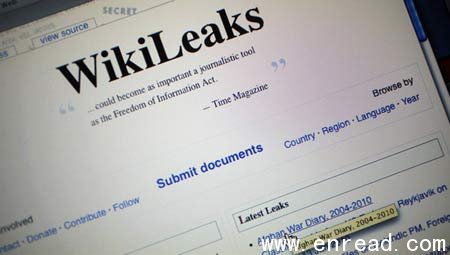The United States on Monday said it was carrying out a criminal investigation1 into WikiLeaks and would pursue the whistle-blower website's chief if he were found to have broken the law.
本周一,美国宣称正对维基解密网站展开刑事调查,如果发现这家泄密网站的主管触犯法律,将予以追缉。

The homepage of the WikiLeaks.org website is seen on a computer after leaked classified military documents were posted to it July 26, 2010 in Miami, Florida.
"We have an active,
ongoing2 criminal investigation
with regard to(关于,至于) this matter," Attorney General Eric
Holder3 told a press conference the day after the website began releasing some 250,000
confidential4 State Department
memos5.
"We are not in the position, as yet, to announce the result of that investigation," he said, adding that the justice and defense6 departments were both probing the website.
"This is not saber-rattling," Holder said when pressed by reporters over what action the United States could take against WikiLeaks founder7 Julian Assange, 39, a shadowy(朦胧的,有阴影的) Australian hacker8 believed to be based in Europe.
"To the extent that we can find anybody who was involved in the breaking of American law... they will be held responsible," Holder said.
"To the extent there are gaps in our laws, we will move to close those gaps. It is not the case that anybody at this point, because of their citizenship9 or their residency, is not a target or the subject of an investigation."
The US diplomatic cables, most from the last three years, reveal a wide array of shocking diplomatic episodes, as well as candid10(公正的,坦白的) assessments11 of world leaders and controversial closed-door remarks.
The White House has strongly condemned12 the release of the documents, saying it places lives at risk and threatens national security.
WikiLeaks has defended the release of the documents, saying they serve the public by exposing "the contradictions(矛盾) between the US's public persona(人物角色) and what it says behind closed doors."
It has also defended earlier document dumps of nearly 500,000 US military incident reports from 2004 to 2009, saying they shed light on the wars in Afghanistan and Iraq.

 收听单词发音
收听单词发音 


